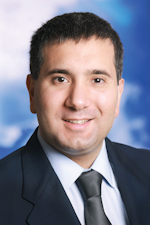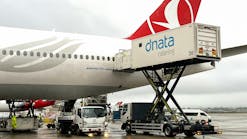How Africa’s Handlers are Mitigating Security Risks
Africa is a large and diverse continent and the security challenges posed in any given country are generally unique to that country and often even to a single city.
There are patterns, however, which are common to the ground handling industry that can be addressed by considering security threats, the implications of the threats, the role of training as a security measure and the effects of COVID-19 on security management in Africa.
According to officials at UAS International Trip Support, security incidents for aviation operations in Africa are limited, as over the past years there have been few reported cases and those incidents were concentrated in specific areas that had larger, underlying security issues.
“Though risk levels differ from country to country, potential threats to operational security can broadly be connected to health risks, political and economic instability, lack of investment and resources and corruption,” say officials of the Africa team at UAS, which has headquarters in Johannesburg, regional offices in Lagos and Nairobi and station managers on the ground at 11 locations on the African continent.
“Health risks such as COVID-19 and Ebola do not just revolve around the possibility of infection but include entry and exit restrictions and protocols that may change suddenly and disrupt a mission unexpectedly, thereby potentially putting crew, passengers and cargo at risk.”
Security Threats
Political and economic instability represent the biggest security threats to aviation operations in Africa.
“One must also consider the condition and state of the aviation infrastructure at the business of operation,” says Heinrich Maritz, aviation security manager at Airlink airline.
In the context of unstable political and socio-economic conditions Menzies is constantly monitoring these situations across individual nations and the continent as a whole.
“The aim is to ensure that our plans to mitigate the effects of these events are as robust as possible. However, more recently we have been presented with new and unexpected obstacles to overcome due to the global pandemic, as several African countries have experienced high infection rates and subsequent restrictions,” says Wilma Kruger, vice president of security management systems at Menzies Aviation.
Protests and armed clashes between pro- and anti-government factions throughout the continent can often pose serious and unpredictable risks to travelers, say UAS officials.
“Instabilities created in conflict zones and troubled spots in Africa have led the emergence of local militia and armed groups constantly seeking soft and profitable targets. Additionally, insurgent groups have made attempts at attacking airports and aircraft in the past but have never succeeded,” UAS Africa team representatives say.
In the planning of an aircraft ground handling company, it is important to be aware of threats including terrorism, crime and corruption which can occur in any country.
“Such crises can unfold rapidly, so we ensure that our response protocols are thorough and streamlined across our operations to neutralize these threats as quickly as possible,” says Kruger. “Equally, we sometimes encounter infrastructure challenges in the form of power outages and network failures, so our teams in the region are quick to react and implement measures that allow us to continue delivering our services despite these difficulties.”
Economic instability, poverty and social inequality can also pose a threat to aviation operations in Africa.
“They can also lead to low investment in airport resources, i.e., growing traffic without corresponding growth in capacity building, equipment, technology and infrastructure to deal with the growth,” officials with the UAS Africa team say. “Sometimes adequate security checks are not being made and there is a low level of compliance by authorities with security policies, and international standards and recommendations, which could be related to the lack of funds, inadequate training and limited technical expertise.
“Also, corruption is a sad reality in some cases, with bribery threatening operations when security checks are used to extort passengers and compromise IDs and checks in exchange for gratifications.”
According to Christian Zweifel, head of Swissport in South Africa, the issue of security is taken very seriously by all stakeholders in the airport environment, with numerous forums addressing the matter at different levels.
“Ground handlers are heavily involved in these multi-discipline forums. The local airport authority and operators undergo regular ICAO, TSA and local CAA audits,” he says.
Implications of Security Threats
Security threats are bound to negatively impact ground handling operations. Indeed, the mere fact that there are security threats present is a concern by itself.
“One must consider the possibility that in the presence of a security threat situation, the threat could be internal, i.e., have infiltrated ground operations. With this in mind, oversight is crucial as well as the use of a reputable ground handler,” says Maritz.
Aircraft can be extremely vulnerable when on the ground, so operators can expect stringent security measures at airports in Africa. The level of security does differ between airports and, in some countries, the security checks could extend the check-in time by more than an hour, according to UAS officials.
“In most cases, extensive security checks are annoying to most passengers and crew especially when similar check points are placed within a few minutes of each other,” they say.
Menzies provides services at airports in different states on behalf of airline operators and must comply with the requirements of the national civil aviation security programs (NCASP), airport security programs, aircraft operator security programs and regulated agent programs; all of these programs are directed by ICAO Annex 17.
“The NCASP of each contracting State is given legal force by virtue of common law, statutory acts and regulations, as applied to situations impacting on civil aviation,” says Kruger. “In the event of a security threat, we would follow state guidance and protocols accordingly. We operate within a secure area thanks to state and airport authoritative bodies monitoring for threats both externally and internally.”
Security threats have the potential to lead to damaged or lost equipment and airport infrastructure, injury or loss of life in the event of any attacks.
“Threats could also imply the possible disruption of air services such as distribution of critical medical and relief supplies in conflict zones and disaster areas, as well as commercial activity,” say UAS Africa officials. “It would be great to see African governments deploying more resources to keep threats minimal – like airport security installations to eliminate insurgent forces and criminal activity.”
Kruger observes that Menzies personnel is involved in the creation of a culture, which values transparency and openness.
“We ensure that they feel empowered to report and investigate incidents should they arise,” she says. “The recent introduction of our employee support program provides additional support to safeguard both the physical and mental health wellbeing of our people, enabling them to do their job to the best of their ability.”
From an operator’s perspective, the best way to mitigate ground handling security threats is to use various layers to ensure accountability, according to UAS officials.
“We regularly dispatch VIP supervisors and station managers to oversee operations and ensure the service being delivered is on par with our customers’ expectations. Our risk mitigation solutions also provide security briefs and deployments according to their unique requirements, adding an extra layer of security and peace of mind,” they say.
Security Training for Personnel
Training is key to mitigating security threats.
“Airport and ground handling staff need to be continuously trained to increase the awareness level of the threats and familiarize with the different ways in which security can be compromised,” UAS Africa team members say.
South Africa Civil Aviation Authority accredited security training is provided to all staff, under the auspices of ICAO Annex 17, notes Zweifel.
“With general awareness training provided to passenger and ramp staff and cargo specific training provided to staff performing cargo handling functions. Training is undertaken every two years,” he says.
Security training aims at making airline and airport staff aware of the various acts of unlawful interference, as well as methods of attack and the perpetrators that may commit these attacks, says Maritz.
“Training also includes what to do in various scenarios and the reporting structures. ICAO Annex 17 and Document 8973 standards are followed with regard to aviation security training,” he says.
In security training, Menzies follows the NCASP of the state and as such ICAO and local civil aviation authority standards.
“Internally, we follow the Training Learning Development Plan for Menzies Aviation, a set of practices streamlined across the group, which includes industry leading safety and security training modules whilst also covering role specific modules that touch on security aspects, e.g., training for appointed and non-appointed persons,” says Kruger. “The training that we provide enables our personnel to follow the procedures developed from the NCASP and aircraft security program, plus any directives issued by the airport authorities or civil aviation authorities.”
Training creates awareness of how aviation can be compromised by security issues, according to UAS officials.
“The role is to educate and make everyone aware of the security and safety of the passengers, pilots and employees at the airport on how to manage different situations, how to identify and report potential accidents and incidents, as well as how to manage big groups of people in danger in the event of a threat or accident taking place,” they say. “Security training is also crucial for ground handling personnel to understand, identify and help prevent threats. Handling personnel interface with nearly all airport users and their role in this area is unquantifiable and therefore should not be compromised.”
Regular and recurrent security training to update staff with emerging threats should be mandatory for all handling personnel and should be a prerequisite for issuance of an airside pass, according to UAS officials.
“Training helps to sensitize everyone in the airport environment to be able to identify and report potential threats to the airport. It is also important that when there is a security breach, the handling staff will know what to do and how to handle passengers and crew,” say members of the UAS Africa team. “They should be able to direct passengers and crew to safety and quickly inform the right people of the threat. This can only be achieved through training. This sort of training helps ramp staff develop a better situational awareness and utilize best practices to ensure the operational security of the flight and make the passengers and crew feel comfortable.”
The Effects of COVID-19
COVID-19 has forced airports to consider a ‘touch-free’ approach for the physical screening of passengers, observes Maritz.
“Airports are depending more on technical/mechanical screening than physical screening. The rest of the security operations remain the same,” he says.
According to UAS officials, to a certain extent the pandemic has made the business more secure.
“The free movement of people has been restricted and protocols are more closely adhered to. Although the traveling public has significantly reduced, security agents have intensified their efforts at the checks while also ensuring the spread of COVID-19 is tamed. This is mitigated by an increase in security personnel to monitor and control the crowd ensuring they act in a manner as required by the country whilst also limiting the risk of the other security threats,” members of the UAS Africa team say. “However, it is important to ensure that while focus and attention is given to addressing the COVID-19 threats continued attention is also paid to conventional aviation security threats.”
Conversely, the impact of the pandemic has meant that unemployment has increased across the continent.
“Additionally, the vaccination rollout across Africa has been more successful in some countries than others, and there are concerns that the pandemic will cause further instability in terms of crime and corruption. Should these threats materialize, the repercussions would transcend from national to global level, as there are growing concerns that airport workers could be colluded into criminal activity,” says Kruger.
Opportunistic crime is rising, with significantly reduced flight schedules, reduced personnel levels and lower commercial income destabilizing preventive measures which are effective in normal times, according to Menzies officials.
“Insider threat risks have greatly increased, which is a challenging consequence of the macro-level disruption caused by the pandemic. We are continuing to work with our people and partners around the group to deliver the best-in-class services that Menzies is known for, whilst managing the complications and issues presented by the pandemic,” concludes Kruger.





